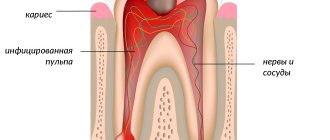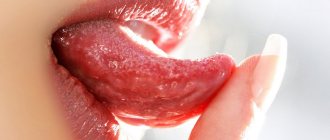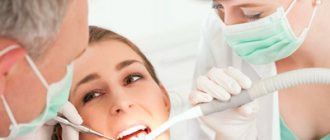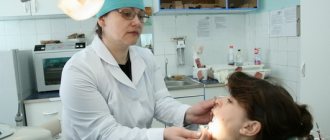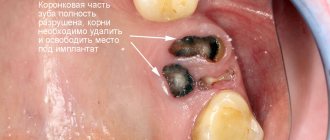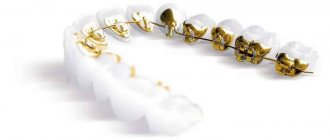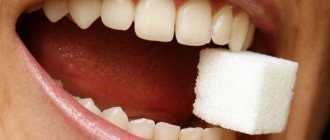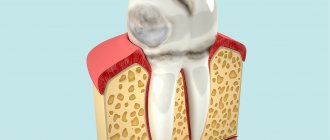Dry mouth or increased salivation
A feeling of dryness or, on the contrary, increased salivation occurs due to the adaptation of the mucous membranes to a foreign body. If the design is made correctly, the discomfort quickly passes. If your mouth is dry, you should drink water more often and rinse, but do not use alcohol solutions. It is worth limiting the consumption of tea, coffee, and at least temporarily giving up smoking. You need to get rid of dryness quickly, otherwise your gums will be injured.
Excessive salivation is a reaction to a foreign body in the mouth, to constant contact with the mucous membrane. It goes away on its own in a few days. You can simplify the adaptation process for the mucous membrane by rinsing with decoctions of chamomile, oak bark or sage, or solutions recommended by your doctor.
Reflex severity
The gag reflex manifests itself in different ways. It is better to choose remedies to help cope with it depending on the severity.
Mild degree
It usually does not cause serious problems during dental treatment. You can deal with it using the following methods:
- When the gag reflex is psychological in nature, the dentist can simply distract the patient. To reduce your stress levels, you can refocus your attention the night before your doctor's visit.
- If the gag reflex is caused by touching the mucous membranes, the doctor protects them with a rubber dam. This is a latex sheet that the dentist uses to cover the mucous membrane. This way it protects it from contact with foreign objects. The rubber dam also allows you to isolate soft tissue from the diseased tooth, providing additional protection.
- Anesthesia. Anesthetic drugs help not only relieve pain in the mouth. They have a freezing effect, the mucous membrane becomes less sensitive.
Average degree
It is very important here to reassure the patient and reduce his anxiety. Regular local anesthesia will not have the desired effect, since it only numbs the pain. Using general anesthesia in such cases is not always justified.
Sedation helps cope well with the problem of fear and nausea. The patient is given nitrous oxide to inhale through a mask. He falls into a relaxed state, but is fully conscious. This is the advantage of sedation over anesthesia, since the contact between the dentist and the patient is completely preserved.
Severe degree
It is not always possible to cope with nausea to such an extent with conventional sedatives. Such cases are an indication for the use of general anesthesia.
Problems with diction
After prosthetics, there is less space in the mouth, which is why the patient may have problems with diction at first: the tongue does not have enough free space, sounds are distorted. To cope with this faster, you will need training. To do this, you can read aloud, pronounce individual complex sounds, and do tongue exercises. The more actively the tongue “works” immediately after prosthetics, the faster the adaptation will take place and normal diction will be restored. When getting used to speaking correctly, you need to make sure that when pronouncing sounds, saliva does not fly from your mouth. A good workout would be tongue twisters that are spoken slowly, making sure that the pronunciation and articulation are correct.
Eating
Chewing skills with a newly installed denture need to be developed gradually. This does not mean that you need to switch to broths, purees and cereals. On the contrary, you need training with a gradual increase in load. The hardness of the products is increased gradually. It is better to start eating vegetables and fruits in small pieces, chewing them thoroughly. They get used to biting food in the same way - gradually, starting with softer foods and moving on to hard foods. You need to chew and bite carefully: it is important not to damage or injure the gums, and to control the load on it.
After installing a removable denture, the patient may feel that food is deprived of its usual taste, it has become less pronounced. This occurs because the base of the structure covers the palate where the tactile receptors are located. This does not affect the perception of taste in any way - taste buds are located on the tongue. The feeling that the taste of food has changed is associated with a foreign body in the mouth and quickly passes as you get used to it.
Do you have questions about removable dentures?
We will call you back within 30 seconds
+7
What can a patient do to reduce the gag reflex?
If you know that you have a pronounced gag reflex, you can prepare for your visit to the dentist in advance. For this you can use medications:
- 4-5 days before visiting the dentist you can take Cerucal and Motilium. In the first days, take half a tablet, and the day before your appointment, take a whole tablet.
- Cerucal can be taken without other medications. In this case, we recommend taking 1 tablet three times a day the day before your appointment, and on the day of visiting the dentist, take one tablet.
- Any medications for motion sickness.
- The night before and on the day of the visit, you can take two Adaptol tablets.
All of these drugs can effectively combat nausea. Usually, if the attacks are caused by fear, it is enough to take medications before 2-3 appointments with the doctor. After this, in most cases, the strong gag reflex that interferes with normal dental treatment goes away.
When nausea is not severe, you can do without pills:
Before dental treatment, it is better not to eat or drink for two hours.
Since nausea is caused by impaired nasal breathing, instill drops that relieve nasal congestion. It is better to do this right before starting treatment.
Rinsing your mouth with soda, salt, mint or eucalyptus-flavored solutions helps to cope with strong salivation.
If you start feeling sick during dental treatment, try to switch your attention. Sometimes shaking your leg is enough to do this. You can block vomiting by breathing. To do this, you need to inhale through your nose and exhale through your mouth.
The dentist must be warned that you have a pronounced gag reflex. This will help the doctor choose the best method to solve the problem. It is often enough to simply reassure the patient or book him in for the second half of the day, since by this time the gag reflex is reduced.
Injuries
In the first days after installation, injured areas may appear on the surface of the gums: small wounds, abrasions, etc. They may appear due to improper chewing technique or sensitivity of the mucous membrane. Normally, the denture stops rubbing the gums within a few days. You can speed up this process by rinsing with antiseptic solutions and chamomile decoction.
If injuries do not go away over time, become more pronounced, or cause increasing discomfort, you should consult a doctor. The problem may lie in the design itself. The doctor will conduct an examination and correct the prosthesis. Usually one correction is enough for the discomfort to go away.
Treatment under anesthesia: you will be calm and comfortable
In my medical practice, I encountered patients who were ready to endure acute toothache just to postpone a trip to the dentist. I understand them and sympathize with them. Most often this is associated with memories from childhood. Everyone probably remembers how they felt when their baby teeth were treated or removed. Many years later, as an adult, a person continues to experience stress in front of the dental chair. And even having already made an appointment, he cannot overcome himself and, under any pretext, tries to reschedule the visit to the doctor.
Unfortunately, patients with such a phobia do not come for preventive examinations, do not undergo professional hygiene, and do not treat caries. As a result, the teeth are destroyed, which leads to their removal.
In fact, the problem of fear of dental treatment is completely solvable. Our clinic has a special procedure - treatment under dental anesthesia, that is, during sleep. There is also such a medical term - sedation. The DomodenT clinic is one of the few that uses an anti-stress technique: while you sleep, we take care of the health of your teeth.
Medication-induced sleep is an absolutely harmless alternative to general anesthesia. You will forget about all your worries, calm down and relax. The combination of safe sedatives with local anesthesia relieves nervous tension.
Treatment under sedation is an ideal way to solve a dental problem. And not only for the patient, but also for the doctor. While you rest, saving strength and energy, the doctor calmly and efficiently performs his work. Your opinion about treatment will change once and for all. You will simply fall asleep and wake up with healthy teeth and a beautiful smile. No anxiety or worries - just relaxation in your sleep.
During the procedure under dental anesthesia, the anesthesiologist monitors your well-being, monitors your blood pressure, breathing, and pulse. As a dental surgeon with extensive experience, I believe that treatment under sedation is completely safe. A combination of sedatives and local anesthesia will help relieve nervous tension. Falling asleep occurs in a few seconds. You won't even feel how the doctor treats the tooth or installs an implant. Unlike general anesthesia, consciousness does not “turn off” during sedation. All vital reflexes are preserved: the ability to breathe independently, cough, swallow.
Under sedation, the patient forgets about fear and calms down. In my practice, there have been cases when clients tried to hide the fact that they were experiencing discomfort. But they were “given away” by high blood pressure, and then treatment was postponed. In such situations, we always recommend calming down and coming next time when the pressure returns to normal.
Sleep therapy for patients with phobia is the best way to forget about pain and relax. During the procedure, the anesthesiologist monitors your condition and, if necessary, reduces the pressure with drugs. We take everything into account to minimize risks.
Patients come to us with an increased gag reflex, which is also a serious problem. It is almost impossible to carry out treatment, because many people begin to feel sick during manipulation. Sedatives used during medicated sleep relieve the gag reflex. And the doctor calmly does his job.
I remember several cases when patients came to us who had already tried to cure a tooth and install dentures. But due to nausea, nothing worked. We helped them. Thanks to anesthesia, caries was removed, implantation with prosthetics was performed, and the patients were satisfied.
Everyone who underwent sleep treatment thank us from the bottom of their hearts. They felt comfortable and didn't hurt at all. Many, upon learning that the DomodenT clinic had such a service, were relieved.
There is an opinion that treatment under sedation is an expensive procedure. However, it is better to eliminate caries under anesthesia than to deal with its complications, for example, pulpitis or periodontitis. Treatment in the acute stage is also not cheap. Implantation and prosthetics will cost even more.
Payment for medicated sleep is hourly. Therefore, we always meet our patients halfway and try to do as many manipulations as possible in an hour to protect clients from stress. We perform the remaining simple work without anesthesia.
Modern dentistry means treatment without pain. Our experienced and sensitive doctors will take care of your psychological comfort and health. Treatment under sedation is the best solution for anyone who has a gag reflex or fears the dentist.
Zhdanov E.V., dental surgeon
Commenting system SigComments
Back to section
Allergic reaction
It occurs very rarely, since all structural elements are made of hypoallergenic, biocompatible materials. It manifests itself as redness of the gums at the contact site; this area may itch and possibly burn. The unpleasant sensations do not go away and do not weaken, they can intensify, the gums look injured.
Allergy is a rejection of construction materials, which may be accompanied by nausea, malaise, and dizziness. It appears almost immediately after installation, disappears after some time if you remove it. There is no point in waiting for adaptation in case of allergies - the reaction will only intensify over time. To solve the problem, you need to find out which material in the structure you are allergic to and make a new prosthesis without using it.
Psychological aspect
Often the use of a prosthesis provokes psychological discomfort in the patient: it frightens him, it seems to him that complications have already arisen, and adaptation is not going well. To prevent such a problem from arising, you need the right attitude: a person must be prepared for the difficulties that may arise in the first days. It is important to take your time and understand that the body needs to get used to new conditions. The period of complete adaptation takes up to one and a half months on average, but the most noticeable discomfort disappears after 1-2 weeks if you wear the prosthesis constantly.
To get used to a removable denture faster, orthodontists at the Dentospas clinic recommend massaging the gums. You can do it yourself, it will improve blood circulation and tissue nutrition, and improve the condition of the gums. Massage is done provided that the surface of the mucous membrane is not injured and there are no open wounds on it. At first, to speed up adaptation, you can leave the prosthesis on at night (install it again after cleaning). This is safe (the gums and tongue hardly move during sleep) and allows you to increase the time of contact of the mucous membrane with the base of the structure.
